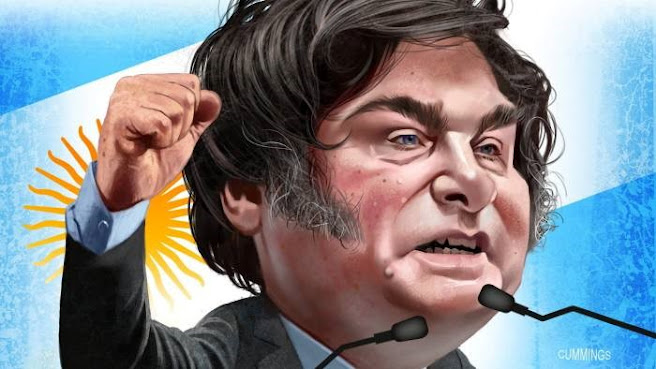Javier Milei, Argentina’s presidential hopeful biting at the establishment’s heels
The self-styled ‘anarcho-capitalist’ hopes to win election by exploiting frustration at the national economic disarray
Ciara Nugent and Michael Stott
Argentina’s latest political sensation is frustrated by the obsession with his dogs.
Why, Javier Milei asks, are they so regularly mentioned in coverage of his insurgent campaign for the presidency?
“I’m the only candidate with real proposals, so they come at me with the fact that I have five dogs,” he told the Financial Times in a recent interview.
“If I’m talking about how to lower inflation, what does it matter if I have five dogs, or 10, or 20?”
Lowering inflation from its current dizzying level of 113 per cent a year is arguably Argentina’s most pressing challenge but Milei’s English Mastiffs do offer clues as to his proposed solutions.
One is named Milton after the free-market guru Milton Friedman.
Another answers to Murray, after Murray Rothbard, an American economist who believed that the private sector could always provide services more efficiently than the state.
Like Rothbard, Milei has described himself as an “anarcho-capitalist”.
Social media videos show him tearing cards with the names of ministries from a wallboard and tossing them into the air to highlight his pledge to shrink the state.
“The state is not the solution,” he says.
“It is the problem.”
Such views might confine him to the fringe in many countries.
But they have struck a chord with some voters in Argentina, a country whose painful descent from European levels of prosperity early last century to its present parlous state provides a world-leading example of government failure.
“Liberalism is present in every aspect of my life,” said Milei, a flamboyant, tousle-haired former TV commentator who at 52 has never held executive office and only entered politics four years ago.
He has vilified the entire Argentine political class as thieves and calls taxes a “violent act”.
Helped by a vigorous campaign on social media, Milei won a narrow victory in Argentina’s presidential primary on August 13, securing 30 per cent of the vote and beating the two main coalitions, the incumbent populist Peronists and the centre-right opposition Juntos por el Cambio (JxC).
Both are now licking their wounds ahead of the first-round presidential election in October as the economy lurches deeper into crisis, with the dollar soaring on the black market to more than double the officially controlled rate and more than 40 per cent of the population living in poverty.
Milei’s solutions are simple: slash spending, balance the budget, replace the hopelessly devalued peso with the US dollar as the national currency and close down the central bank.
At high-energy campaign rallies, the economist wears a black leather jacket and leads the crowd in chants of “Long live freedom, dammit!” — his catchphrase.
Milei’s direct, earthy style and the anger he channels have prompted comparisons with Donald Trump and Jair Bolsonaro, Brazil’s former leader.
The Argentine has shared platforms with members of their inner circle but is arguably even more of an outsider.
A bus driver’s son, he grew up in a working-class suburb of Buenos Aires, spending six hours a day on the football pitch before studying economics.
He has never married but lives with his “four-legged children”, as he calls his dogs, and is very close to his sister Karina, who manages his campaign.
In a string of jobs at think-tanks and universities, Milei was competent but “never distinguished himself academically”, said Fernando Marrul, a Buenos Aires economist who taught alongside Milei.
“Where he set himself apart was in the media.”
Milei became a fixture on TV and radio shows and inspired a litany of TikTok and Instagram fan accounts, mostly devoted to his unruly mod-style hair.
“He has a natural grasp of humour and irony,” said Claudio Rico, a comedian who impersonates Milei.
But his irascible media persona is also authentic.
Asked by the Financial Times if his aggressive attacks on Argentina’s political class could make it hard for him to govern, he shook slightly with anger.
“I’m aggressive?” he said.
“A murderer is a murderer.
A thief is a thief.
And that’s what you call them.
They’re an organised crime group — the biggest criminal organisation in the world — called ‘the state’.
Why should I treat them any other way?”
Apart from shaking up politics, Milei has unnerved Argentina’s business establishment.
Some express fears about the unworkability of dollarisation, recalling Argentina’s failed experiment with pegging the peso to the US currency.
Privately, they fret about Milei’s lack of executive experience and his tendency to make incendiary off-the-cuff remarks that rattle markets.
Milei has done little to assuage such fears.
In media interviews this week, he claimed he would rather be “taken out dead” from the presidential palace than bow to protests about his rule, and labelled China, Argentina’s second biggest trading partner and one of its main creditors, an “assassin” because of its repressive political system.
While Argentine politicians have historically moderated their tone as they move closer to elections, Milei appears to be “doubling down” on beliefs that have little consensus in Argentina, said Lucas Romero, director of pollster Synopsis Consultores.
That may win enough votes in October to secure Milei a place in a run-off election but it raises questions about how he might govern if he won.
“There is no demand for moderation from Milei’s voters,” Romero said.
“When you ask Milei’s voters if they’re worried about Milei blowing up Argentina’s systems, they say: let it blow.”

0 comments:
Publicar un comentario